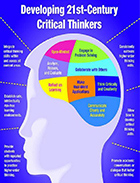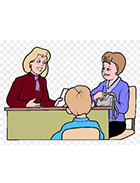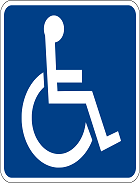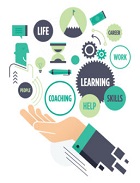Safe Surfing
Safe Surfing
The technological advancements and information available online captivate not only children but also the adults. Parents find it fascinating  when their child learns something new and shares it with others. All this works great as long as the child browses safe and doesn’t get caught in the cyber trap. It is during such times that parents need to address the topic of internet safety to their children.
when their child learns something new and shares it with others. All this works great as long as the child browses safe and doesn’t get caught in the cyber trap. It is during such times that parents need to address the topic of internet safety to their children.
Internet safety or cyber safety is the safe use of internet. It also means to protect oneself from crimes that occur with the aid of internet.
The increase in cyber crimes like phishing, spamming, hacking, etc. have created a need for a safe internet. Though safety has been introduced in the form of internet filters and firewalls, it can only be effective when the users are aware of the risks.
What can be done to make the internet child-safe?
There are certain steps that can be taken to make the internet child-friendly:
- Change the privacy settings
Web browsers and websites usually have an option of deciding what information is shared with public. Parents can change the settings accordingly before letting the child use the internet. Schools can adopt the same by blocking most of the harmful websites.
- Make the child understand what is clickable and what is not
Children can be told about pop-ups containing viruses that harm the system or about how pop-ups are not to be clicked.
- Allocate a screen time for internet browsing
Screen time is essential when using the internet. Each age group of children have a certain specified screen time when using the internet. Parents should enforce this timing and should ensure that the children stick to it.
- Always ensure an adult is present when the child uses internet
It is advised for an adult to be present when the child uses the internet. Children should be taught to ask before clicking any link they come across on the internet.
- Choose child-friendly versions of website
Websites like Google have a child-friendly version of browsing (called Kiddle). Parents should ensure that the children use child friendly websites.
The dangerous web…
According to a recent research, 95% of the teenagers have a smartphone, of which 45% of them are consistently online. Parents and schools should take steps to ensure that children are not exposed to too much of internet. Children face the following risks online:
- Cyberbullying

This is a form of bullying or harassment, where technology is used to threaten, embarrass, or target another person. This is also called as cyberstalking and is considered as a legal offence. The harassment can range from a text or an online post to impersonation.
- Cyber predator
Cyber predators are internet users who exploit children using the social media. Children in their early teens can be permitted to use social media as long as they are doing so with their parents.
- Sharing information
Children may end up sharing personal information online, to strangers they come across.
- Phishing
Phishing is a fraudulent practice of obtaining sensitive data by disguising as a trusted entity. Often, links pose to be trustworthy and ask the browsers to share personal information like addresses, card details, etc. Children should be made aware of such websites and activities and should be discouraged from sharing information online.
- Scams
Clicking on emails with links or responding to unknown people may lead to scams. Scam is a method adopted by people to commit fraudulent activities.
- Malware
Sometimes, the child may end up clicking on a link containing a malware or a ransomware. This may result in the computer losing all its data or being affected by virus. Apart from installing an antivirus, the child can be told to talk to an adult before clicking any link.
- Posts
It is often said that, what is shared on the internet can leave a lasting effect. Children should be made to understand the contents that can be shared online and things that cannot be shared online.
- Internet addiction due to over usage
Internet addiction occurs due to over usage. When children are not given a screen time limit, they tend to get addicted to the virtual world. This may lead to poor eating habits or over binging, disturbed sleep pattern and certain behavioural issues. Care should be taken by parents or educators to restrict the internet usage.
The Do’s and Don’ts
There are certain do’s and don’ts that should be followed to ensure internet safety. Some of them are:
- Do’s –
- Post limited personal information online
Posting little or no personal information online or on social platforms helps to curb cyberstalking.
- Browse safe
Safe and child-friendly browsing options can be opted over the usual ones.
- Adjust the internet settings
The internet settings can be adjusted to ensure maximum privacy.
- Use strong passwords
Strong passwords can be created, children can be told not to share passwords in public or with friends.
- Always reach out to an adult at home/school in case of any issue
Children should know that they can always rely on an adult to help them out in case of any issue.
- Don’ts –

- Do not share any information/pictures with strangers
Children should be told not to share any personal information with strangers they meet online.
- Do not engage in cyberbullying
Cyberbullying is a crime and must be reported immediately. Parents should talk to children and make them aware of what cyberbullying is and what action can be taken when faced with a cyberbully. Children should also make it a point to not engage in any form of cyberbullying.
- Do not befriend unknown people
The internet is a dark web. A child should be told not to talk to strangers or befriend any unknown person. Parents must keep a tab of the internet activity.
- Avoid clicking on any pop-ups
Pop-ups are often a source of virus/malware. Parents should firstly install firewall and should block all pop-ups. Children should be taught about how clicking unknown links can cause harm to the computer.
- Do not believe everything that is shared online
Children should always check the facts they read online by talking to their parents about it. Reading false information can misguide the child.
Despite being a boon in the field of education and learning, internet can pose great threats to children, when not handled properly. Parents and teachers should highlight the dangers of internet. Safe surfing should be given importance and children should be asked to report any issue they come across.





















